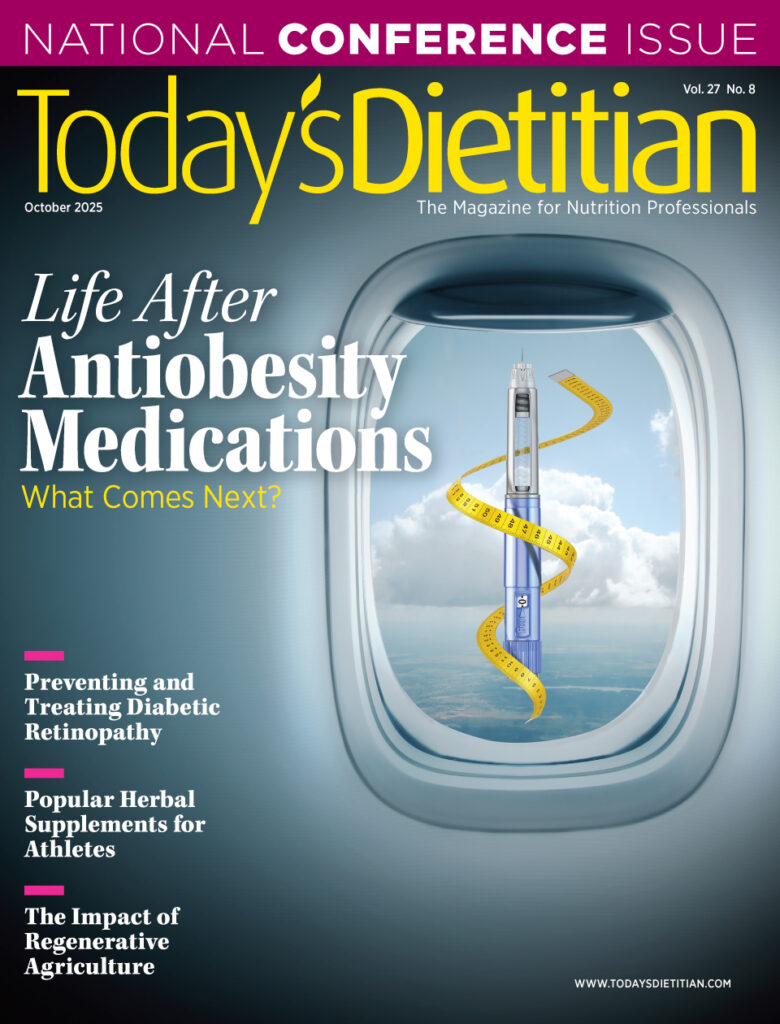Today’s Dietitian
Vol. 18, No. 10, P. 10
Does it live up to its purported health claims?
Q: Many of my clients are asking about ghee butter. They say it improves digestion and heart disease and is better tolerated by those with lactose intolerance. Is there any truth to these claims?
A: Ghee has been gaining much attention in the media. However, most of the scarce amount of research conducted has been with animals, and few studies support its claims.
Ghee vs Butter
Ghee, also known as clarified butter, is made by slowly melting butter while allowing the water to evaporate. This enables the milk solids to separate, resulting in a translucent, golden liquid called ghee. Since the milk solids have been removed, the smoke point is much higher than for butter at 485° F vs 350° F, respectively, making it a perfect cooking medium widely used in Indian cuisine.
One teaspoon of Organic Valley ghee provides 45 kcal, 5 g total fat, 3 g saturated fat, 0 g protein, 0 g carbohydrates, and 4% of the daily recommended amount of vitamin A. The same serving of unsalted butter contains 34 kcal, 4 g fat, 2 g saturated fat, 0 g protein, 0 g carbohydrates, and 2% of the daily recommended amount of vitamin A. Ghee has a higher calorie, fat, and vitamin A content because it’s a more concentrated form of fat than butter.
Suggested Health Benefits
Ghee has been touted to have numerous health benefits, including decreasing inflammation, increasing metabolism, and improving heart health. However, most of the studies on ghee have been animal studies. Furthermore, over the last several decades, ghee has been blamed for the increased incidence of coronary artery disease (CAD) in Asian Indians because of its high saturated fat content. A 2010 study published in Ayu — An International Quarterly Journal of Research in Ayurveda found that rats placed on dietary supplements containing 10% ghee had significantly higher serum triglyceride levels after four weeks compared with rats fed rodent chow.1 However, there was no significant difference in total serum cholesterol.
A 2013 review that examined the myths vs facts of ghee determined that ghee isn’t as harmful to heart health as it may appear.2 The authors explain that ghee contains short chain fatty acids (SCFAs) that may help strengthen and develop cell membranes. In addition, SCFAs are easier to digest, and they increase the excretion of dietary cholesterol and bile acids from the gastrointestinal tract, which may help those with CAD. Coconut oil advocates also have used this same argument—that SCFAs are beneficial.
However, according to the 2015–2020 Dietary Guidelines for Americans, the source of ghee, butter (a saturated fat), has been linked to heart disease. The recommendations state that no more than 10% of total daily calories should come from sources of saturated fat. The guidelines also state that palm and coconut oils should be treated like saturated fats.
Furthermore, according to the American Heart Association (AHA), people who eat Indian cuisine typically overconsume ghee, and therefore saturated fat.3 The AHA recommends choosing and preparing foods without it.
Another claim is that people with a dairy allergy can consume ghee; however, ghee is derived from dairy milk so those with a dairy allergy should avoid it. There also have been claims that ghee is more easily digestible in those with lactose intolerance because the milk solids have been removed. However, butter also is extremely low in lactose (0.01 g per tablespoon) and is well tolerated by those with lactose intolerance. To compare, 1 cup of milk contains 12 g of lactose, which, according to the National Institutes of Health expert panel, is the suggested amount that an adult or adolescent with lactose intolerance can tolerate in a single dose.
As for other purported health benefits of ghee, including speeding up metabolism and decreasing inflammation, the science is insufficient to make these claims.
Client Recommendations
Ghee, like any fat high in saturated fat, should be consumed in small amounts as part of an overall healthful, balanced diet. If clients want to consume ghee, then nutrition professionals should work with them to help keep consumption of saturated fat at or below the recommended 10% daily maximum.
— Toby Amidor, MS, RD, CDN, is the founder of Toby Amidor Nutrition (http://tobyamidornutrition.com) and the author of the cookbook The Greek Yogurt Kitchen: More Than 130 Delicious, Healthy Recipes for Every Meal of the Day. She’s also a nutrition expert for FoodNetwork.com and a contributor to US News Eat + Run and MensFitness.com.
References
1. Sharma H, Zhang X, Dwivedi C. The effect of ghee (clarified butter) on serum lipid levels and microsomal lipid peroxidation. Ayu. 2010;31(2):134-140.
2. Manohar Reddy A, Satish V, Nagamounica M, Manoj Kumar M. Myths and facts about consumption of ghee in relation to heart problems. Int J Pharm Pharm Sci. 2013;5(Suppl 2):560-563.3. Tips for eating Indian food. American Heart Association website. http://www.heart.org/HEARTORG/HealthyLiving/HealthyEating/DiningOut/Tips-for-Eating-Indian-Food_UCM_308366_Article.jsp#. Updated July 7, 2016. Accessed on August 10, 2016.


